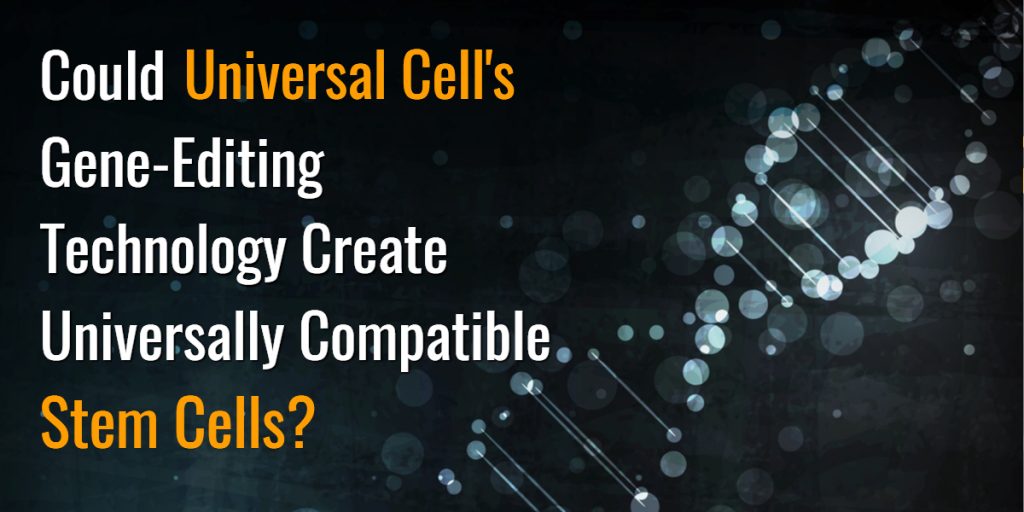I had the honor to interview Gregory Block, VP of Business Development for Universal Cells. Universal Cells is a private biotechnology company based in Seattle, Washington, that is revolutionizing the stem cell field by creating stem cells that are universally compatible.
[*Note: Universal Cells was acquired by Japanese biopharmaceutical giant Astellas Pharma on February 14, 2018, for $102.5 million plus potential milestones.]
Interview with Gregory Block, VP Business Development for Universal Cells
Cade Hildreth: What is your background and how did you get involved with Universal Cells?
Gregory Block: I have a background in stem cell biology and was trained at the University of Washington Institute for Stem Cell and Regenerative Medicine, where I met Dr. Mitchell and Dr. Russell. I dropped everything to be the first person to join Universal Cells, since I sincerely believe that solving the problem of allogeneic cell rejection is required for stem cell therapeutics to reach their full potential.
Cade Hildreth: What year was Universal Cells founded and by whom?
Gregory Block: Universal Cells was co-founded by Dr. Claudia Mitchell and Dr. David Russell in 2013.
Cade Hildreth: How has Universal Cells been funded so far?
Gregory Block: Universal Cells received $300,000 in seed funding through angel investors, followed by a direct-to-phase II SBIR grant from the NIH and then revenues from two therapeutic licensing deals.
Cade Hildreth: What is Universal Cells’ core technology?
Gregory Block: Universal Cells’ core technology is our nuclease-free gene editing platform which can be used to edit any gene. We use the technology to remove the genes that are required for antigen presentation in stem cells to create our Universal Donor Cells. We also use our gene editing technology as a gene therapy, where we can edit a patient’s own gene and correct the underlying cause of disease.
Cade Hildreth: What are the benefits of this technology, compared to traditional gene editing approaches?
Gregory Block: Universal Cells Inc. uses recombinant adeno-associated virus (rAAV)-mediated gene editing as our proprietary approach to accurately edit chromosomal genes in human stem cells without the use of genotoxic nucleases. The rAAV delivery platform is effective in human ESCs and iPSCs, and AAV vectors have been used safely in numerous clinical trials. An rAAV vector was the first gene therapy drug to receive regulatory approval. Importantly, our technology solves the three major hurdles to effective genome editing:
- Accuracy
- Delivery
- Safety
Our genome editing technology enables the generation of customized stem cells that are designed to contain any desired genetic modification. This can include deletions, insertions, or point mutations. Unlike nuclease-based genome editing, our approach is not genotoxic. It does not require a double strand break, nor it generates off-target alterations to the genome, or produce unwanted mutations at the target site. It also does not introduce nuclease genes into the cell that may have unintended effects.
Cade Hildreth: How could Universal Donor Cells alter the market for stem cell based therapies?
Gregory Block: Universal Donor Cells solve the problem of allogeneic rejection, and have a number of advantages in comparison to other types of stem cells. First and foremost, a single cell line can be expanded, differentiated into a therapeutic cell type of choice, prepared for human administration, and certified by regulatory agencies. This allows extensive analysis of a single cellular product, thereby ensuring that any clone with undesirable features is avoided. Unlike cells derived from patient-specific iPSCs, Universal Donor Cells can be prepared ahead of time and are ideal for treating genetic diseases since they do not harbor disease-causing mutations.
An additional benefit of HLA-negative cells is that they will not present auto-antigens, so they could be used to treat autoimmune diseases such as type I diabetes or genetic diseases where an introduced gene product might otherwise be immunogenic. Similarly, Universal Donor Cells do not present minor histocompatibility antigens, which will still be a problem for HLA-matched stem cell banks. Patients that receive Universal Donor Cells will not require toxic immunosuppression to prevent rejection.
Cade Hildreth: Universal Cells is also working on the development oftherapeutics to target and correct underlying genetic causes of disease. What is the company’s involvement in this area?
Gregory Block: Universal Cells’ Corrective Gene Editing Program aims to correct disease-causing mutations by ex-vivo genome editing using rAAV vectors. The modality is the safest potential gene therapy approach since we are not introducing any nucleases or exogenous promoter elements into cells. We are leveraging very strong preclinical data demonstrating full functional correction in rare hematological diseases.
Cade Hildreth: What is the importance of strategic partnerships to Universal Cells?
Gregory Block: Strategic partnerships are an important part of helping us reach our goal of advancing our Universal Donor Cell technology to the clinic. We provide considerable expertise in gene editing and manufacturing and greatly benefit from partnering with companies with complimentary expertise. For example, a partner company can provide expertise on manufacturing a differentiated therapeutic cell product.
Cade Hildreth: What strategic partnerships have you announced to date?
Gregory Block: We have announced partnerships with Adaptimmune to produce Universal Donor T-Cells derived from pluripotent stem cells. We have also partnered with Healios K.K. to produce universal donor iPSCs for select diseases of the eye, liver, and kidney.
Cade Hildreth: What are your 3-5 year goals for the Universal Cells?
Gregory Block: In the next few years, we will be focusing on:
- manufacturing off-the-shelf clinical-grade Universal Donor Cells,
- advancing our Corrective Gene Editing Program into the clinic,
- developing our own internal programs for Universal Donor Cells in selective indications,
- continuing to build partnerships with other cell therapy companies
Cade Hildreth: When do you anticipate testing rAAV-mediated gene editing in pre-clinical models? In clinical trials?
Gregory Block: We have started our pre-clinical studies for our Corrective Genome Editing Program and are aiming to conduct human studies within 3-4 years.
Cade Hildreth: How can people get in touch to learn more about Universal Cells?
Gregory Block: We can be found at www.universalcells.com or reached at info@universalcells.com.
